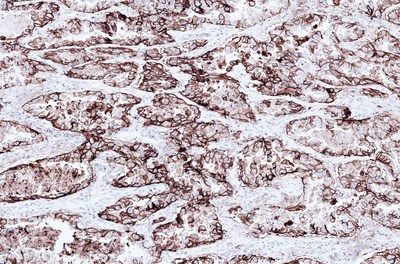Roche's VENTANA PD-L1 (SP263) test gains CE label expansion as a companion diagnostic to identify non-small cell lung cancer patients eligible for Tecentriq
Roche announced the CE label expansion of the VENTANA PD-L1 (SP263) Assay, a significant development for non-small cell lung cancer (NSCLC). This assay helps identify patients who may benefit from Tecentriq immunotherapy post-surgery. The expansion is based on the Phase III IMpower010 study, which demonstrated a 57% reduction in disease recurrence for patients with high PD-L1 expression. With this advancement, Roche aims to enhance personalized healthcare and improve patient outcomes in NSCLC.
- CE label expansion of VENTANA PD-L1 (SP263) Assay enhances Roche's companion diagnostics portfolio.
- The assay identifies NSCLC patients eligible for Tecentriq, potentially reducing recurrence risk by over 50%.
- The IMpower010 study showed a 57% reduction in disease recurrence for patients treated with Tecentriq.
- None.
- The VENTANA PD-L1 (SP263) Assay helps determine which patients with non-small cell lung cancer may benefit from treatment with Tecentriq immunotherapy based on the results of the Phase III IMpower010 study.1
- This label expansion strengthens Roche's industry-leading portfolio of companion diagnostics and builds on its commitment to improve personalised healthcare for better patient outcomes.
TUCSON, Ariz, Aug. 24, 2022 /PRNewswire/ -- Roche (SIX: RO, ROG; OTCQX: RHHBY) today announced CE label expansion of the VENTANA PD-L1 (SP263) Assay in non-small cell lung cancer (NSCLC) as a companion diagnostic for Tecentriq® (atezolizumab). This advances the company's commitment to guide clinical decision making through innovative, high quality assays that improve patient access to personalised healthcare.
The current standard of care for patients with early stage lung cancer is removal of the tumour, which may be followed by chemotherapy. Unfortunately, about half of these patients will have their cancer return following surgery.2 The European Commission approved Tecentriq in June 2022 as adjuvant treatment following surgery and platinum-based chemotherapy for adults whose Stage II-IIIA NSCLC tumours have high PD-L1 protein expression. The VENTANA PD-L1 (SP263) Assay identifies NSCLC patients who may be eligible for Tecentriq monotherapy in this indication, potentially reducing their risk of disease recurrence or death by more than half.
"With early detection of lung cancer, it is possible to give patients more treatment options and potentially improve a patient's outcome," said Jill German, Head of Pathology Lab at Roche Diagnostics. "We are proud to offer a PD-L1 test that may qualify lung cancer patients for Tecentriq therapy. With this latest expansion, clinicians can consider multiple targeted immunotherapy options with one test to quickly determine the right treatment for each patient."
The VENTANA PD-L1 (SP263) Assay was used in the IMpower010 study sponsored by Genentech, a member of the Roche Group, to identify patients whose tumours expressed the PD-L1 protein. The IMpower010 clinical study began in 2015 with the goal of understanding how patients would respond to treatment with Tecentriq following traditional surgery and chemotherapy. In 2021, Genentech reported a
Lung cancer remains the leading cause of cancer-related deaths worldwide, with more than 2.2 million people diagnosed globally last year.3 The launch of Roche's VENTANA PD-L1 (SP263) test as a companion diagnostic to identify non-small cell lung cancer patients eligible for Tecentriq demonstrates the company's commitment to improve patient access to personalised healthcare.
About the VENTANA PD-L1 (SP263) Assay
VENTANA PD-L1 (SP263) Assay is used to detect programmed death ligand-1 (PD-L1) protein in non-small cell lung carcinoma (NSCLC) patients. PD-L1 expression on tumour cells and immune cells has been shown in clinical studies to help predict the likelihood a patient may benefit from PD-L1/PD-1 immunotherapy drugs.4
VENTANA PD-L1 (SP263) Assay testing is performed on a BenchMark ULTRA instrument and is visualised using the OptiView DAB IHC Detection Kit.
Roche has developed a leading, comprehensive and differentiated lung cancer immunohistochemical portfolio, with biomarkers that support multiple guidelines for the diagnosis and stratification of lung cancers.
About Roche
Founded in1896 in Basel, Switzerland, as one of the first industrial manufacturers of branded medicines, Roche has grown into the world's largest biotechnology company and the global leader in in-vitro diagnostics. The company pursues scientific excellence to discover and develop medicines and diagnostics for improving and saving the lives of people around the world. We are a pioneer in personalised healthcare and want to further transform how healthcare is delivered to have an even greater impact. To provide the best care for each person we partner with many stakeholders and combine our strengths in Diagnostics and Pharma with data insights from the clinical practice.
In recognizing our endeavour to pursue a long-term perspective in all we do, Roche has been named one of the most sustainable companies in the pharmaceuticals industry by the Dow Jones Sustainability Indices for the thirteenth consecutive year. This distinction also reflects our efforts to improve access to healthcare together with local partners in every country we work.
Genentech, in the United States, is a wholly owned member of the Roche Group. Roche is the majority shareholder in Chugai Pharmaceutical, Japan.
For more information, please visit www.roche.com.
All trademarks used or mentioned in this release are protected by law.
References
[1] Pivotal Phase III study shows Roche's Tecentriq helped people with early lung cancer live longer without their disease returning. https://www.roche.com/media/releases/med-cor-2021-03-22.
[2] Yano T, et al. Therapeutic strategy for postoperative recurrence in patients with non-small cell lung cancer. World J Clin Oncol. 2014;5(5):1048-1054.
[3] World Health Organization: GLOBOCAN 2020 – Lung Cancer: Estimated cancer incidence, mortality and prevalence worldwide. [Internet; cited May 2021] 1.Available from: https://gco.iarc.fr/today/data/factsheets/cancers/15-Lung-fact-sheet.pdf.
[4] VENTANA PD-L1 (SP263) Assay. CE marked Package Insert. Roche Diagnostics; 2022
For further information please contact:
Jo Lynn Garing, Roche Diagnostics Communications
Mobile: +1 317-363-7286
E-mail: jo_lynn.garing@roche.com
![]() View original content to download multimedia:https://www.prnewswire.com/news-releases/roches-ventana-pd-l1-sp263-test-gains-ce-label-expansion-as-a-companion-diagnostic-to-identify-non-small-cell-lung-cancer-patients-eligible-for-tecentriq-301611199.html
View original content to download multimedia:https://www.prnewswire.com/news-releases/roches-ventana-pd-l1-sp263-test-gains-ce-label-expansion-as-a-companion-diagnostic-to-identify-non-small-cell-lung-cancer-patients-eligible-for-tecentriq-301611199.html
SOURCE Roche








